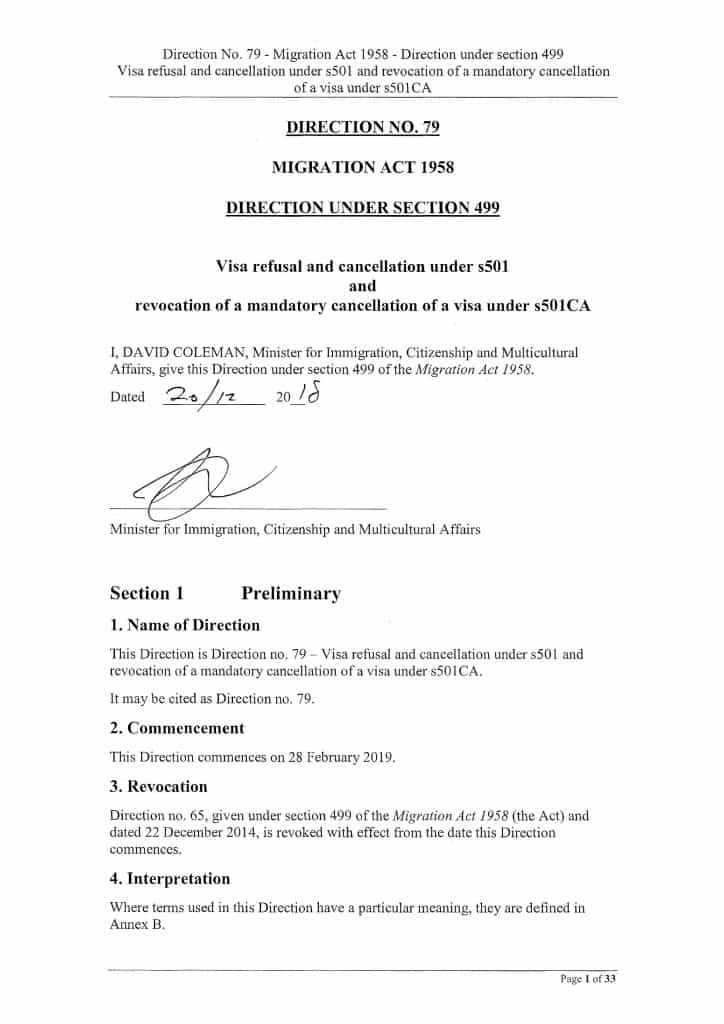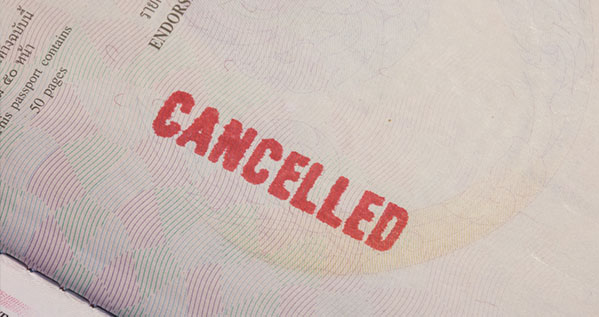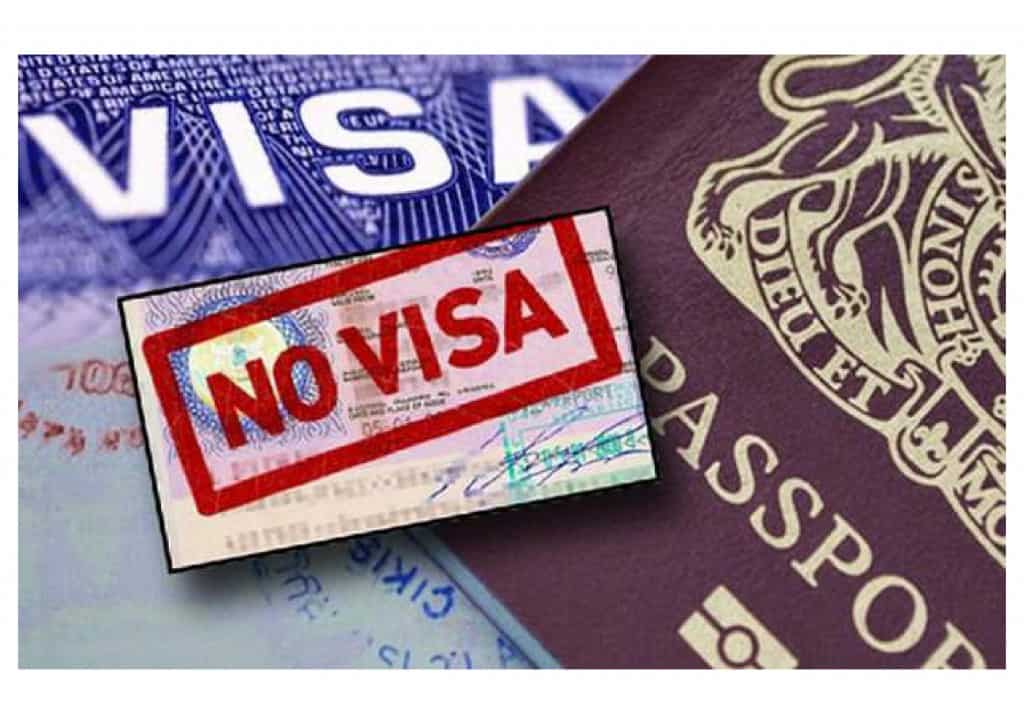
Ministerial Direction No 79 Visa Refusal & Cancellation explains that a non-citizen who has committed a serious crime, including of a violent or sexual nature, particularly against women or children or vulnerable members of the community, such as elderly or disabled, should be denied the entry to, or to forfeit the privilege of staying in Australia.
The Minister Direction No 79 states that in some circumstances, criminal offending or other conduct, and the harm that would be caused if it were to be repeated, may be so serious, that any risk of similar conduct in the future is unacceptable.
The Minister Direction No 79 clarifies that Australia has a higher level of tolerance of criminal or other serious conduct if the non-citizen has lived in the community for most of their life, or from a very young age. In addition, having been making a positive contribution to the community, and the consequences of a visa refusal or cancellation for minor children and other family members in Australia, will be considered in determining whether to cancel or refuse the visa.
Refuse to grant a visa
Your visa application can be refused if you do not satisfy the Minister that you pass the character test (s501(1)).
Cancel a visa
The Minister can cancel your visa if the Minister’s delegate reasonably suspect that you do not pass the character test (s501(2)(a)) and you do not satisfy the Minister’s delegate that you pass the character test (s501(2)(b)). Click here to learn more about visa cancelled on character grounds.
Refuse or Cancel a visa in national interest
The Minister may refuse to grant you a visa (s501(3)(a)) or cancel your visa (s501(3)(b)) if the Minister reasonably suspects that you do not pass the character test (s501(3)(c)) and the Minister is satisfied that the refusal or cancellation is in the national interest.
Mandatory Cancellation (while in jail)
The Minister must cancel your visa if (s501(3A)) if he is satisfied that you do not pass the character test (s501(3A)(a)) because you have a substantial criminal record (s501(3A)(a)(i)) or have sexually based offences involving a child (s501(3A)(a)(ii)) and you are servicing a full-time sentence of imprisonment (s501(3A)(b)).
Revocation of cancellation under s501(3A) while serving imprisonment
Section 501CA applies if Minister make a decision under s501(3A) to cancel your visa while you are serving a sentence of imprisonment.
The Minister in deciding whether to revoke the s501(3A) cancellation will have regard to relevant information (other than non-disclosable information) that (s501CA(2)):
- Would be the reason, or a part of the reason, for cancelling your visa under s501(3A); and
- is specifically about you or another person and is not just about a class of persons of which the person or persons is a member: s501CA(2)(a)-(b))
After cancelling your visa, the Minister must as soon as practicable give you, in a way appropriate in the circumstances (s501CA(3)):
- a written notice that sets out the decision to cancel under s501(3A); and
- particulars of the relevant information (s501CA(3)(a)(i)-(ii))
The Minister must invite you to make representations within the certain time frame and in certain manner why the cancellation decision should be revoked (s501CA(3)(b)).
The Minister may revoke the s501(3A) cancellation is you makes representations and if the Minister is satisfied that you pass the character test or there is another reason why the cancellation should be revoked (s501CA(4)).
If the Minister revoked the original visa cancellation decision, then the cancellation is taken not to have been made (s501CA(5)).
However, your detention (in MITA) is taken to be lawful and you will not be entitled to claim against the government or any person because of your detention (s501CA(6)).
You should be aware that even if you have made representation for the Minister to revoke your visa cancellation, the Minister may choose not to exercise s501CA(4) power and you will not be to apply to the AAT to merits review under Part 5 or 7 (s501CA(7)).
Ministerial Direction No 79
When you make representations to the Minister not to refuse or cancel your visa under s501, or revocation of mandatory cancellation of your visa under s501CA, the decision-maker must have regard to the Ministerial Direction No 79 (made under s499).
Ministerial Direction No 79 lists the primary and other considerations the decision maker must take into consideration before making a decision to refuse or cancel your visa. Furthermore, information and evidence from independent and authoritative sources will be given appropriate weight. Primary considerations are given greater weight than the other considerations.

Visa cancelled for not passing the character test
Cancelling a visa (Part A)
The Ministerial Direction No 79 states that when considering cancelling a visa, the following are primary considerations:
- protection of the Australian community from criminal or other serious conduct;
- the best interests of minor children in Australia;
- expectations of the Australian community.
The Ministerial Direction No 79 provides the following as other considerations (not limited to):
- international non-refoulement obligations;
- strength, nature and duration of ties;
- impact on Australian business interests;
- impact on victims;
- extent of impediments if removed from Australia.

Visa refused for failing the character test
Refusing a visa (Part B)
The Ministerial Direction No 79 states that when considering refusing a visa, the following are primary considerations:
- protection of the Australian community from criminal or other serious conduct;
- the best interests of minor children in Australia;
- expectations of the Australian community.
The Ministerial Direction No 79 provides the following as other considerations (not limited to):
- international non-refoulement obligations;
- impact on family members;
- impact on Australian business interests;
- impact on victims;
Revocation of visa cancellation (Part C)
The Ministerial Direction No 79 states that when considering whether to revoke the mandatory cancellation of a visa, the following are primary considerations:
- protection of the Australian community from criminal or other serious conduct;
- the best interests of minor children in Australia;
- expectations of the Australian community.
The Ministerial Direction No 79 provides the following as other considerations (not limited to):
- international non-refoulement obligations;
- strength, nature and duration of ties;
- impact on Australian business interests;
- impact on victims;
- extent of impediments if removed from Australia
Note: If you holds a Protection visa and the visa is cancelled, you will be prevented from making an application for another visa, other than a Bridging Visa R (Class WR: s501E; reg. 2.12A). You will be prevented (by s48A) from making another application for a Protection visa while you are in Australia unless the Minister determines that s48A does not apply to you (s48B). Click here to learn more about Protection Class XA Subclass 866 visa.
Making representation not to refuse or cancel visa
When you make representations to the Minister, you should include:
- Your marital status –
provide the name, date of birth and citizenship of your spouse or de facto
partner; and date of marriage or relationship started; and whether you are
living with him/her. You should also describe your relationship with your
spouse/partner, for eg,
- how you met,
- how long you have been together,
- future plans together,
- current impact or likely impact on them if you are deported
- Your parents details, including their date of birth, citizenship and/or country they where they live
- List
all your children, including their names, sex, date of birth, nationality, visa
status, who they live with and how often you have contact with them. If you are
separated or divorced from your children’s parent, do you have court orders
granting you custody, child maintenance payments, care arrangements, etc. You
should also describe your relationship with each of your child/ren including:
- the role you play in his/her life
- the likely impact on them if you are deported
- List
all other minor children in your life in Australia (including grandchildren,
nieces/nephews, foster children, etc), including their full names, sex, date of
birth, nationality, parents’ names, what relationship is the child to you,
where they live and how often you have contact with them. You should also
describe your relationship with each of them, including:
- the role you play in his/her life
- any likely impact on them if you are deported
- You should list your family details (not listed above), including parents, step-parents, brothers, sisters, and adult children. List their full name, relationship to you, date of birth, nationality and country of current residence.
- List other close family members including in-laws, cousins, grandparents, uncles/aunts. List their full name, relationship to you, date of birth, nationality and country of current residence.
- List other relatives you have in Australia and overseas, including the number of uncles/aunts, nieces/nephews, cousins and grandparents; and the country they currently residing. You should also describe the likely impact on them if you are deported.
- If you have criminal history or adverse serious conduct, you should list the factors that caused your offending or other serious conduct.
- List any courses or programs that you have completed that help you to avoid further offending or other serious conduct (provide evidence).
- If you have previously received a warning(s) from the Department and have offended since, you should explain any circumstances why you have re-offended.
- You should provide information on what you believe to be the risk of you offending in the future or engaging in serious conduct in the future. You should support your reasons.
- If you are currently on parole or subject to reporting requirement, please name the reporting officer, contact number and the date your parole or reporting ends. You should provide a copy of the conditions of your parole/court order and/or a report from your parole/supervising officer describing your behaviour while in the community. You should also provide prison conduct reports, if available.
- If you are currently listed on a Sex Offenders Register, you should provide details of reporting obligations, expiry, etc.
- If you are currently subject to a Domestic Violence Order/Apprehended Violence Order or other Court order, you should provide details.
- If you have other charges against you that have not been dealt with, please provide details.
- If you have a medical issue, please provide details (and evidence from your medical practitioner) listing your treatment and medication or counselling, etc.
- If deported, do you have any concerns or fears about what would happen to you if you were to return to your home country. If yes, please describe your concerns and fears, and what you think will happen to you if you return.
- If you face any criminal charges/convictions in your home country, you should describe what would happen about these matters on your return.
- Do you have any other problems that you would face if you are deported back to your home country, if yes, please describe them.
- If you have other information or consideration that you would like the Minister to consider, please describe them (and provide evidence, if available).
Documents to provide
- Current passport
- Spouse/partner passport and/or immigration status
- Marriage Certificate or Divorce Certificate
- Children’s birth certificates, passports and their immigration status
- Family Court or other court orders relating to children
- Evidence of nature of your relationship with children, eg, prison telephone or visit records, letters from children or statement from child’s carer, etc
- Evidence of rehabilitation course or programs, educational or vocational courses completed
- Report from counsellor / medial practitioner regarding progress made for rehabilitation
- Domestic Violence Orders or other court orders and reporting obligations
- Prison conduct report
- Parole report and reporting conditions
- Character references from family, friends, employers and members of the Australian community – they must state they are aware of your offending and criminal history or other serious conduct
- Employment references commending on your reliability, attitude to work, etc
- Medical report concerning impediments you would face if you were returned to your home country.
Please note that Direction No 79 is replaced by Direction No 90, click here to learn more.
You should note that if your visa application has been refused or your visa cancelled while you are in Australia, you may be prevented from lodging another visa application (click here to learn more about section 48 bar and visa application limitations).
If your visa has been cancelled, you may be prevented for 3 years from applying for another visa (click here to learn more).
Australian migration law is complex and difficult to understand, contact our immigration lawyer for a consultation (fee applies) to help you understand the Ministerial Direction No 79 or click here to find other answers or click here learn more about the history of Ministerial Direction No 79.

 041 222 4020 or WeChat: AUDvisa
041 222 4020 or WeChat: AUDvisa
This article is not intended to be or taken as migration legal advice. The author of this article disclaims any liability for any action or omission on the information provided or not provided in this article. You should always consult an immigration lawyer or a registered migration agent to form an informed opinion on your immigration matter



